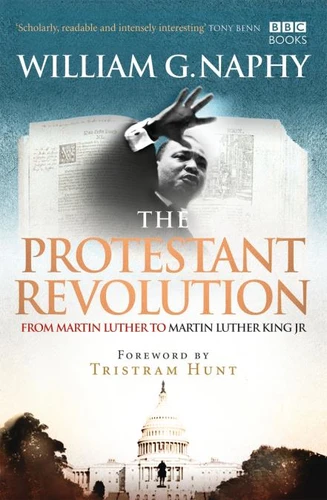The Protestant Revolution. From Martin Luther to Martin Luther King Jr.
Par :Formats :
Disponible dans votre compte client Decitre ou Furet du Nord dès validation de votre commande. Le format ePub protégé est :
- Compatible avec une lecture sur My Vivlio (smartphone, tablette, ordinateur)
- Compatible avec une lecture sur liseuses Vivlio
- Pour les liseuses autres que Vivlio, vous devez utiliser le logiciel Adobe Digital Edition. Non compatible avec la lecture sur les liseuses Kindle, Remarkable et Sony
- Non compatible avec un achat hors France métropolitaine
 , qui est-ce ?
, qui est-ce ?Notre partenaire de plateforme de lecture numérique où vous retrouverez l'ensemble de vos ebooks gratuitement
Pour en savoir plus sur nos ebooks, consultez notre aide en ligne ici
- Nombre de pages320
- FormatePub
- ISBN978-1-4464-1689-1
- EAN9781446416891
- Date de parution31/08/2011
- Protection num.Adobe DRM
- Infos supplémentairesepub
- ÉditeurBBC Digital
Résumé
When Martin Luther nailed 95 criticisms of the Catholic Church to the door of his local church in 1517 he sparked not just a religious Reformation, but an unending cycle of political, social and economic change that continues to this day. By challenging the authority of the Pope, Luther inadvertently unleashed a revolutionary force: the power of the individual to determine his or her own thoughts and actions.
Over four centuries later, the Protestant minister Martin Luther King Jr was acting on the same revolutionary principle when he rejected racial discrimination and spearheaded the US Civil Rights Movement. The legacy of the Reformation is all around us, influencing our work life, our family life, even our sex life, as well as our political views and sense of national identity. From literature to science, from gay marriage to the 'War on Terror', a vibrant struggle for Protestant principles is alive in Britain, America and the developing world.
This is the story of the Reformation and its lasting legacy - in effect, how Protestantism created the modern world.
Over four centuries later, the Protestant minister Martin Luther King Jr was acting on the same revolutionary principle when he rejected racial discrimination and spearheaded the US Civil Rights Movement. The legacy of the Reformation is all around us, influencing our work life, our family life, even our sex life, as well as our political views and sense of national identity. From literature to science, from gay marriage to the 'War on Terror', a vibrant struggle for Protestant principles is alive in Britain, America and the developing world.
This is the story of the Reformation and its lasting legacy - in effect, how Protestantism created the modern world.
When Martin Luther nailed 95 criticisms of the Catholic Church to the door of his local church in 1517 he sparked not just a religious Reformation, but an unending cycle of political, social and economic change that continues to this day. By challenging the authority of the Pope, Luther inadvertently unleashed a revolutionary force: the power of the individual to determine his or her own thoughts and actions.
Over four centuries later, the Protestant minister Martin Luther King Jr was acting on the same revolutionary principle when he rejected racial discrimination and spearheaded the US Civil Rights Movement. The legacy of the Reformation is all around us, influencing our work life, our family life, even our sex life, as well as our political views and sense of national identity. From literature to science, from gay marriage to the 'War on Terror', a vibrant struggle for Protestant principles is alive in Britain, America and the developing world.
This is the story of the Reformation and its lasting legacy - in effect, how Protestantism created the modern world.
Over four centuries later, the Protestant minister Martin Luther King Jr was acting on the same revolutionary principle when he rejected racial discrimination and spearheaded the US Civil Rights Movement. The legacy of the Reformation is all around us, influencing our work life, our family life, even our sex life, as well as our political views and sense of national identity. From literature to science, from gay marriage to the 'War on Terror', a vibrant struggle for Protestant principles is alive in Britain, America and the developing world.
This is the story of the Reformation and its lasting legacy - in effect, how Protestantism created the modern world.



